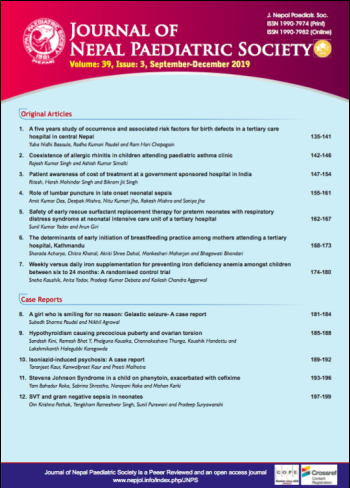Weekly versus Daily Iron Supplementation for Preventing Iron deficiency Anaemia Amongst Children Between Six to 24 Months: A Randomised Control Trial
DOI:
https://doi.org/10.3126/jnps.v39i3.28272Keywords:
anaemia, anaemia prevention, iron deficiency, iron supplementation, serum ferritinAbstract
Introduction: Iron deficiency anaemia is common in developing nations and starting iron supplementation from infancy is an important measure for its prevention. There is still not enough evidence, whether giving iron twice weekly as compared to daily, is enough to prevent the same.
Methods: This open-labeled randomised control trial was conducted at a tertiary care facility over a period of 1.5 years. After informed consent from parents, a total of 125 non-anaemic healthy infants in age group six to 24 months; with birth weight > 2500 grams, born singleton at term gestation and predominantly breastfed in the first six months of life; were randomised using computer generated sequence to two groups. Control group received daily elemental iron supplementation of 1 mg/kg/day and the intervention group received twice weekly 2 mg/kg/day. Haemoglobin, serum ferritin were measured at enrolment and at the end of 100 days. Primary outcome was anaemia defined as haemoglobin less than 11 mg/dl. Secondary outcome measures were weight gain, increase in length and occipito-frontal circumference.
Results: Baseline characteristics were similar in the two groups. This study showed significantly higher mean haemoglobin (mg/dl) (mean ± SD 11.882 ± 0.3237, 11.683 ± 0.4264, p = 0.009) and mean serum ferritin (ng/ml) (mean ± SD 101.704 ± 23.0263, 62.149 ± 24.2079, p = 0.000) at end of 100 days in the control group than the intervention group. There was no difference in any of the secondary outcomes.
Conclusions: Biweekly iron supplementation can also prevent iron deficiency anaemia in children between six to 24 months of age but daily is better in respect to the increase in haemoglobin.
Downloads
Downloads
Published
How to Cite
Issue
Section
License
Authors who publish with this journal agree to the following terms:
Authors retain copyright and grant the journal right of first publication with the work simultaneously licensed under a Creative Commons Attribution License that allows others to share the work with an acknowledgement of the work's authorship and initial publication in this journal.
Authors are able to enter into separate, additional contractual arrangements for the non-exclusive distribution of the journal's published version of the work (e.g., post it to an institutional repository or publish it in a book), with an acknowledgement of its initial publication in this journal.
Authors are permitted and encouraged to post their work online (e.g., in institutional repositories or on their website) prior to and during the submission process, as it can lead to productive exchanges, as well as earlier and greater citation of published work (See The Effect of Open Access).



